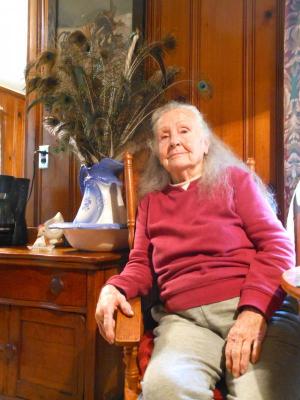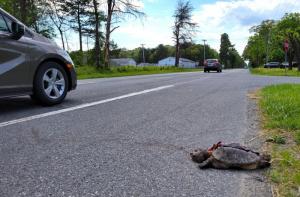Obituary photo serves as reminder that everyone has a story
I grew up in this business. One of the important things I took in as a child and then as a fledgling reporter was that most of the people I’m going to speak with have no relationship with the media other than as a source of information. Yes, every community has a core group of people who are in the news on a regular basis; however, the vast majority of individuals have never participated in an interview or had their picture taken for a story.
I was also taught that individuals who don’t have a recurring relationship with news outlets are often the eyes and ears behind the scenes of the community, and just because they aren’t seeking media attention doesn’t mean they don’t have a story to tell. The recent publication of the obituary photo for Irene Short Dickerson reminded me of this relationship. I took the photo as part of a Saltwater Portrait in 2016.
Dickerson lived about a mile up the road from me for a decade. I would drive by her house off Plantation Road on the way to work every day. It was one of the few remaining farmhouses on the now-busy road. For years, almost every day, there was at least one peacock perched on the top of her fence watching cars go by. Occasionally, especially in the morning, I could hear the unforgettable shrill her peacocks made.
I didn’t have a good reason to interview Dickerson. I was just interested in the peacocks and why a person would have them in such a busy area. One afternoon I stopped by unannounced, introduced myself, asked if she would be interested to sit down for a portrait. A petite woman, I’m sure she was wondering why a strange man showed up unexpectedly, but to her credit she said yes. We arranged a date and time for me to come back. She was pleasant and ready to talk. She took me around the property. Introduced me to Petey the peacock and showed off the chicks she had growing in her kitchen. When we were done, she insisted I take a handful of the long peacock feathers she had in vases around her house. It was as simple as that. She had the peacocks on this road because she liked them, and they were there before almost all the surrounding developments. She wasn’t about to get rid of them.
After conducting the interview, I typed up the portrait and, as with most interviewees, I never heard from her again. I’m assuming the peacocks slowly died away because after a while they were no longer waiting on the fence, and I stopped hearing their calls. I’d see Dickerson outside sometimes when I drove by, but that was about it. Occasionally, she would cross my mind because those feathers she gave me have been sitting in a vase in my home since the interview. Otherwise, though, I hadn’t thought about her much since the story was published almost six years ago.
I immediately recognized the photo when I saw her obituary. It was an unexpected reminder that most of the time, the individuals gracing the pages of this newspaper will only get one chance to tell their story. It’s our job to make it worth remembering.
Come on, now. Watch out for turtles
I grew up in a family that pulled over its vehicle for turtles to help them make their way across roads. That’s why over the years I’ve written a few stories about watching out for turtles. For as long as I’m given this space, around this time of year, I’m going to keep the message going.
This year’s reminder was spurred by the sight of a dead snapping turtle lying on the side of Route 16, on that long straightaway between Milton and Ellendale. Basically a log with legs, it would have been nearly impossible to miss this snapper crossing the road. Yet, there it was. Shell cracked down the middle. Its legs and head sprawled out. It was a shame to see it lying there as cars drove by.
I’m not saying a person should cause an accident to avoid a turtle, but sometimes we could all be a little more aware of our surroundings. If you hit a turtle – or any wildlife, for that matter – and you’d like to try to save it, contact the Delaware Council of Wildlife Rehabilitators and Educators. It’s a nonprofit organized in 1995 that treats sick, injured and abandoned wildlife with the goal of returning them to the wild. The website is dewildliferescue.com and the phone number for Sussex County is 302-228-1063.
Joke of the Week:
Joke submissions are running low – as in nonexistent. That’s OK. I know people are reading the jokes. I’ve had a number of people tell me over the past few weeks the jokes could be better or they don’t make sense. My response: Send me some, then. For now, we all have to suffer through my sensibilities. As always, joke submissions can be sent to cflood@capegazette.com.
Q: What did the fisherman say to the magician?
A: Pick a cod, any cod.
Chris Flood has been working for the Cape Gazette since early 2014. He currently covers Rehoboth Beach and Henlopen Acres, but has also covered Dewey Beach and the state government. He covers environmental stories, business stories, random stories on subjects he finds interesting and has a column called ‘Choppin’ Wood’ that runs every other week. Additionally, Chris moonlights as the company’s circulation manager, which primarily means fixing boxes during daylight hours that are jammed with coins, but sometimes means delivering papers in the middle of the night. He’s a graduate of the University of Maine and the Landing School of Boat Building & Design.

























































